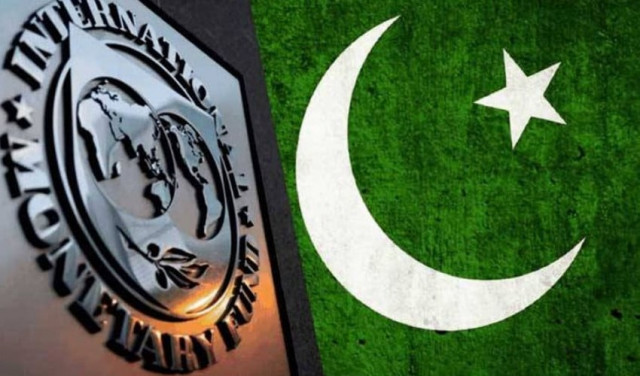IMF flags Pakistan's tax shortfall, loan delays
Lender pushes Islamabad to align provincial and federal tax frameworks

Pakistan's tax shortfall and a delay in materialising foreign loans have emerged as the main concerns of the International Monetary Fund (IMF) while Punjab's new agriculture income tax law is still not fully aligned with the federal legislation and in deviation to the National Fiscal Pact.
But Punjab Information Minister Azma Bukhari denied that there was any breach of the pact, claiming that the newly-amended provincial law was addressing the needs of the National Fiscal Pact.
In addition to Punjab, the Sindh government was also in violation of the National Fiscal Pact, as it did not show any serious intentions to implement the pact during meetings with the IMF, sources said. But compared to Sindh, Punjab at least has passed the law, although a muted one.
At the end of the five-day sudden visit, the global lender shared its assessment with Pakistani authorities on Friday. The mission led by Nathan Porter had arrived for staff-level talks due to some "recent developments" with regards to the implementation of the $7 billion package.
The sources said that an underperformance by the Federal Board of Revenue (FBR) and a delay in finalising the loans for filling the $2.5 billion gap were the two major concerns. Pakistan was again asked to contact Riyadh and Beijing for securing oil on deferred payments and debt rescheduling, respectively.
At the conclusion of the talks, the Pakistani authorities claimed that the IMF had not yet given its final verdict on the issue of bridging revenue shortfalls and it would send the "asks" after consultations with its headquarters in Washington.
In addition, the IMF had concerns about the delay in the privatisation of the power distribution companies (DISCOs) and also remained stuck to its condition of amending the Pakistan Sovereign Wealth Fund Act by the end of December.
The IMF emphasised on amending the gas sector definition of circular debt and ensuring its monthly reporting. Both the power and the petroleum divisions do not regularly report these numbers.
The IMF also found flaws in the implementation of the National Fiscal Pact, which had been signed by all the five finance ministers to align the income tax rates and transferring some expenditure responsibilities to the provinces.
The sources said that the IMF had asked for developing the property tax and agriculture income tax regime by provinces through legislation in line with the FBR
Punjab agriculture law
Although the Punjab Assembly has passed the Agriculture Income Tax Amendment Act, 2024, it fell below the desired target of raising the agriculture income tax rates to 45%.
According to the law, the right to determine the income tax rate has been retained by the Punjab government, which will set the rates through rules, instead of embedding those in the law. The law does not mention 45% agriculture income tax rate, which is not in line with the National Fiscal Pact.
"In proviso to sub-section (3), for the words "Second Schedule", the word "rules" shall be substituted," reads the newly approved provincial law.
The federal law mentioned the income tax rates in the Income Tax Ordinance of 2001 and this gives the right to levy tax to the elected representative of the people. The provincial government has taken away this right from the Punjab Assembly by retaining it with itself.
The new law states that "the government may, by notification in the official Gazette, prescribe special procedure for scope and payment of tax, filing of return and assessment in respect of such categories of tax payers, in such areas, as may be specified therein".
It further states: "Any amendment made in the rules, to the extent of rates of agricultural income tax, during a financial year, under sub-section (1), shall be laid in Provincial Assembly of the Punjab at the time of presentation of the Annual Budget for the next financial year."
This tantamount to just intimating the assembly and it has also failed to achieve a major programme objective of raising agriculture income tax rates to 45%. But in case of super tax on agriculture income, the provincial law is aligned with the federal tax law.
Punjab official version
In many acts the government has the authority to notify rates. Similarly in the Agriculture Income Tax Act now the government has the authority to notify the schedule of rates, said Azma Bukhari, the provincial information minister.
She stated that there was no best legal practice that stated that rates were to be part of the act. "The rates are taken out of the Act and the government will notify them separately," she said. "It's not in any breach. Even the IMF has read the amendments, and they are fine with them," she added.
"If there was any breach then the IMF would have said that during last two days' meetings," the information minister said. The Express Tribune has seen the draft of the Agriculture Income Tax Bill, which proposed to mention the new 45% rate in the law.
The National Fiscal Pact states that "amend the Agriculture Income Tax regimes to fully align them, through necessary legislative changes, with federal personal income (small farmers) and corporate income (commercial agriculture) tax regimes".
The information minister said that only rates of taxation had to align with the FBR income tax rates. The laws did not need to be aligned in every other way under the National Fiscal Pact.
Provincial surplus
In yet another major development, the finance ministry on Friday withdrew its October 31 report in which it stated that the Punjab government ran a budget deficit of Rs160 billion and as a result the overall cash surplus target of Rs342 billion was missed.
In a press statement, the finance ministry said that it now "endorses the views of the government of the Punjab on achievement of a provincial surplus of Rs40 billion during Q1 for FY 2024-25". However, Punjab's Rs40 billion surpluses was still lower than the envisaged one for the first quarter.
The ministry stated that the Punjab had remained one of the most important contributors to the provincial surplus during the recent years; and for FY 2024-25 it had budgeted a provincial surplus of Rs630 billion as agreed with the IMF.
In order to convert Punjab's Rs160 billion deficit into Rs40 billion surplus, the finance ministry reduced the provincial spending figure of Rs1.03 trillion to Rs827 billion – a cut of Rs203 billion or one-fifth. This was done by reducing the amount of the statistical discrepancy from Rs378 billion to Rs177.5 billion.
According to the revised report of the finance ministry, the adjustment in the statistical discrepancy was on account of the investment that the provincial government made in the federal debt. The investment had now been excluded from expenditure.
The finance ministry stated that it shared the updated quarterly fiscal operations figures with the IMF on November14. "With concurrence of the Fund, the IMF has updated the revised figures at its website, showing a provincial surplus of Rs40 billion for Punjab", according to the ministry.
The ministry added that after the revision, Pakistan had managed to achieve a cumulative provincial surplus of Rs360 billion against a target of Rs342 billion agreed with the IMF for the first quarter.



















COMMENTS
Comments are moderated and generally will be posted if they are on-topic and not abusive.
For more information, please see our Comments FAQ